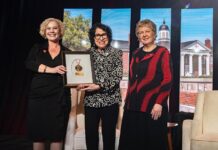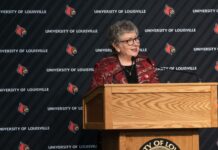
LOUISVILLE, Ky. – Faculty shortages and limited clinical training space are forcing nursing schools to reject thousands of qualified applicants, compounding the national shortfall of nurses as baby boomers age and increase demands on health care.
U.S. nursing schools turned away about 64,000 qualified applicants in 2016, mostly because of an insufficient number of faculty. However, in response to the demand for more nurses in the workforce, the University of Louisville School of Nursing has increased its enrollment by 66 percent in the past five years through a creative solution to the faculty shortage.
From fall 2013 to fall 2017, applicants admitted to the UofL Bachelor of Science in Nursing program have increased from 60 to 100 students per semester, eliminating the need to turn away qualified candidates.
Driving student capacity issues at nursing schools is faculty retiring at a rapid rate. The average ages of doctorally-prepared nursing faculty holding the ranks of professor, associate professor and assistant professor were 62.2, 57.6, and 51.1 years respectively, according to the American Association of Colleges of Nursing.
As more faculty retire and enrollment increases, the UofL School of Nursing has relied more on nurses employed full-time at health care agencies to work as part-time lecturers of clinical courses. Also, the school has reconfigured classrooms to expand clinical simulation lab space.
“The school works very hard to meet the workforce and student demands in the face of faculty shortages,” said Ruth Staten, Ph.D., A.P.R.N.-C.S.-N.P., associate dean for academic programs and associate professor at the UofL School of Nursing. “Amazing nurses from the practice community help us provide an excellent education to our students.”
In the past decade, UofL also has expanded its degree options for preparing new nurses. These include the Master’s Entry into Professional Nursing program, designed for people who want to transition to a career in nursing and already have a bachelor’s degree in a different field, and the only traditional nursing baccalaureate program based in Owensboro.
“In a given year, we are admitting 270 pre-licensure nursing students into our programs,” Staten said.
Other initiatives by the school aim to support undergraduate student success. Last year, UofL created a nursing Living-Learning Community, where first-year nursing majors live in the same residence hall with access to tutors, an adviser available outside regular business hours and social activities to help with networking.
The School of Nursing also works with high schools to ensure students take courses that build a proper foundation for a future major in nursing.
#WeAreUofL


























